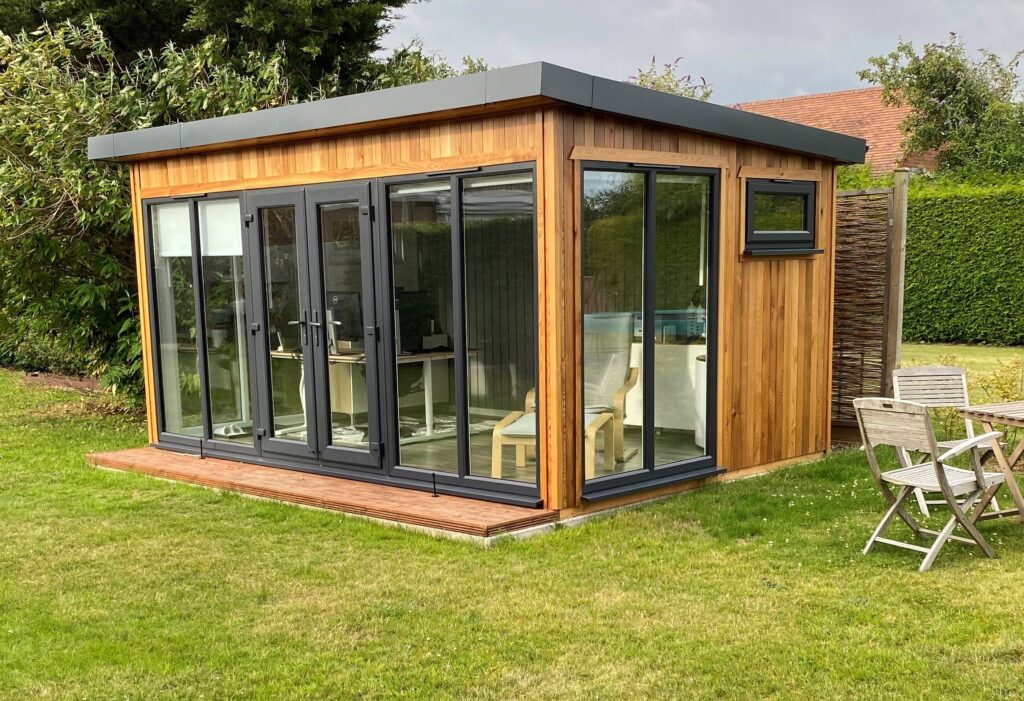The Sustainable Benefits of Working Remotely From a Garden Office

In the last four years, the world has witnessed a significant shift in the way we work. The concept of remote work, once considered a novelty, has gained widespread acceptance and reshaped our perceptions of the traditional workplace. This shift has also opened up new conversations about sustainability in our professional lives – and as we reassess our working habits, garden offices emerge as a green alternative.
From reducing carbon emissions and conserving natural resources to encouraging more eco-friendly habits, we will examine the tangible impacts of this emerging trend on our planet.
The Remote Work Take Over
We know all too well how businesses across the world were forced to embrace remote work solutions, propelled by the necessity of social distancing measures – all facilitated by powerful communication tools and cloud-based platforms. This shift has paved the way for innovative workplace solutions to come into the light, allowing homeowners and freelancers to build their work schedules around their home base.
6 Environmental Benefits of Opting for a Garden Office
1. Reduction in Commuting

By working from home for just two to four days a week, one person can reduce their individual carbon emissions by up to 29%. This absence of a commute also results in considerable time savings, allowing individuals to redirect their energy towards more productive endeavours or simply enjoy a better work-life balance.
2. Decrease in Paper Usage

Traditional office settings often rely heavily on printed materials, from memos and reports to forms and contracts. This excessive paper usage contributes to deforestation, increased waste, and a larger carbon footprint associated with the production and transportation of paper products. With remote work, the majority of documentation is handled digitally, reducing the need for physical printouts.
3. Encouragement of Eco-Friendly Diets

Working from home presents a unique opportunity to cultivate healthier and more sustainable eating habits. Remote workers can better control their food choices without the constraints of a traditional office setting. By preparing meals at home, individuals can minimise reliance on pre-packaged, processed foods, which often contribute to increased waste and resource consumption. Plus, the convenience of a home kitchen encourages meal planning and preparation, reducing the temptation to rely on takeout or meal deals.
4. Reduced Energy Consumption

Home offices typically require significantly less energy than their traditional counterparts, as they are smaller and more localised spaces. In the UK specifically, commercial workspaces account for around 18% of our total carbon footprint – and energy used in office spaces hits a whopping 60%. In contrast, remote workers have greater control over their energy usage, enabling them to implement eco-friendly practices such as using energy-efficient lighting, regulating temperature settings, and unplugging devices when not in use.
5. Less Plastic Usage

The convenience culture of the office environment generally favours single-use plastics for everything, from milk cartons to meal packaging. Those working from home can counter this issue by using reusable household items instead, especially when it comes to food and drink – as they would have bought and used these items anyway.
6. Improved Air Quality

Reducing vehicles on the road due to remote work has a direct and positive impact on air quality. Cities that saw significant shifts towards working from home during the pandemic experienced notable improvements in air quality, with reductions in emissions contributing to clearer skies and healthier environments.
Bespoke Garden Offices – A Step in the Right Direction
Investing in your own garden office is a surefire way to reap the rewards of the benefits above. We also only use responsibly and sustainably sourced materials in the construction of our garden offices and pods, so you can rest assured that your construction is having a minimal effect on the environment within your garden and beyond it.
A garden office’s design and orientation can be optimised for natural light, reducing the need for artificial lighting and thereby lowering energy consumption. The potential for incorporating renewable energy sources, such as solar panels, further diminishes the carbon footprint of these bespoke workspaces. And for our only use of responsibly and sustainably sourced materials in the construction of our garden offices and pods.
By embracing these innovative workspaces, we can further reduce our environmental impact, support local ecosystems, and promote a healthier, more balanced lifestyle.
Design a Bespoke Space for Your Work and Your Ideas
We encourage everyone to carefully consider the broader environmental impacts of their work choices and take proactive steps towards a more sustainable future. Explore the possibilities of remote work and try building your garden office quote today.
